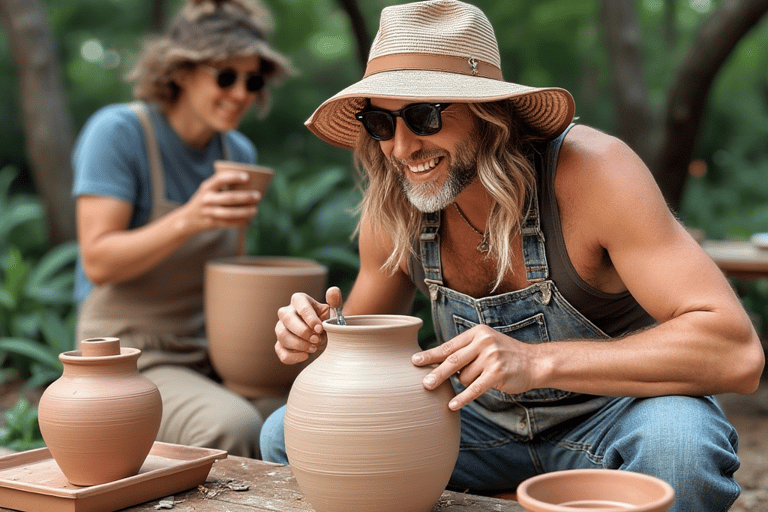TRANSFORM TRANSCEND TRIUMPH -- GO PRIMAL!
Get Your Hands Dirty: The Joy of Playing with Mud (and Learning a Thing or Two Along the Way)
8/20/20244 min read
Rediscovering Creativity through Mud Play
Engaging with mud offers a unique and tactile experience that can reignite the spark of creativity often dimmed by the pressures of adulthood. The simple act of getting one’s hands dirty can unlock a world of imaginative possibilities. Making mud sculptures is one such activity that lets creativity run wild. From crafting simple shapes to more elaborate figures, each creation is a testament to one's inventiveness. Similarly, designing mud paintings with natural elements like leaves, twigs, and pebbles can convert ephemeral ideas into tangible art forms.
Another intriguing activity is constructing miniature villages. This not only taps into one's architectural instincts but also encourages a deep engagement with detail and storytelling. By using mud as the foundational material, one can build tiny houses, roads, and even small community setups which stimulate the imagination and foster problem-solving skills. Figuring out how to make structures stable and aesthetically pleasing pushes one to think outside the box, an invaluable trait in any creative endeavor.
Real-life examples underscore the magic of mud play. One such anecdote is the creation of "Mudtown" from childhood memories. As a child, constructing an entire village out of mud on a lazy summer afternoon not only provided endless hours of fun but also honed skills in planning, execution, and creative thinking. The muddy hands and garments from such adventures are symbolic of unbridled creativity and joy.
By engaging in these activities, one can reconnect with a purer form of expression often lost in the grind of daily life. Moreover, the transformative power of mud play strengthens the imagination, fosters resourcefulness, and encourages innovative thinking. These benefits underscore the broader theme that getting one's hands dirty is not just child's play, but a powerful tool for adults to rediscover their creative potential.
Connecting with Nature: The Science and Benefits of Mud
Engaging with nature, particularly through activities involving mud, offers a surprising range of benefits, both scientifically and emotionally. Studies have shown that exposure to soil bacteria like Mycobacterium vaccae can positively influence mental health. This beneficial bacteria stimulates serotonin production in the brain, which can improve mood, reduce stress, and act as a natural antidepressant. The bacteria are absorbed through the skin or inhaled, allowing their serotonin-boosting effects to take place even with simple contact with the soil.
Mud play also contributes to a strengthened immune system. Regular exposure to the diverse microbiome found in soil during childhood can reduce the likelihood of developing allergies and autoimmune diseases later in life. These microorganisms help condition the immune system, teaching it to differentiate between harmless substances and potential threats. Consequently, time spent outdoors engaging in activities like mud play not only supports physical health but also builds resilience.
Moreover, mud play fosters a profound connection with nature, encouraging mindfulness and grounding. The tactile experience of feeling mud between one's fingers or toes enhances sensory awareness, anchoring individuals in the present moment. This immersion can serve as a form of natural therapy, reducing anxiety and promoting a sense of calm. Engaging with natural elements like mud also nurtures creativity and cognitive development, particularly in children, by offering them an unstructured environment to explore and imagine.
Incorporating mud play into daily life can be straightforward and rewarding. For adults, activities such as gardening or ceramic art can provide the dual benefits of creative expression and physical connection with the earth. For children, supervised mud kitchens or play areas can encourage exploration while ensuring safety. It is vital to practice balance and sustainability, integrating mud activities in a way that respects natural habitats and promotes environmental consciousness.
Ultimately, reconnecting with the natural world through mud play is a simple yet powerful way to enhance both mental and physical well-being, fostering a deeper appreciation for the environment that sustains us.
Hands-On Learning: Practical Skills Gained from Mud Play
Engaging in mud play offers a wealth of practical skills and educational experiences that extend beyond simple recreation. One of the most significant lessons to be learned involves the principles of physics, such as understanding viscosity and density. As children manipulate mud, they notice its consistency changes with varying water content, providing a tangible example of these physical properties. This hands-on approach makes abstract concepts more concrete, aiding in the development of critical thinking skills.
Additionally, mud play serves as an introduction to basic biological principles. As children dig and sift through the soil, they encounter various microorganisms and insects, introducing them to the basics of soil composition and the ecosystem's inhabitants. Such activities nurture curiosity and offer direct interaction with the natural world, fostering a deeper appreciation and understanding of biological diversity and the importance of environmental stewardship.
Moreover, the art of constructing stable structures with mud can teach foundational concepts in engineering and architecture. Children experimenting with building mud towers and walls learn about balance, weight distribution, and structural integrity. These basic construction principles form the bedrock of more complex engineering concepts, providing young learners with an early technical foundation through enjoyable, tactile activities.
Hands-on experiences like these are particularly beneficial for tactile and kinesthetic learners, who thrive on physical interaction with their learning material. At Primal Path Academy, a strong emphasis is placed on experiential learning. Testimonials from educators and parents highlight how mud play has benefited students by improving their problem-solving abilities and fostering a sense of teamwork and creativity. One success story from Primal Path Academy recounts a group project where students built a mud fort, learning the importance of collaboration and planning.
By integrating these practical lessons into play, mud activities become a powerful educational tool, providing children with valuable skills and knowledge that will benefit them throughout their academic journey and beyond.

